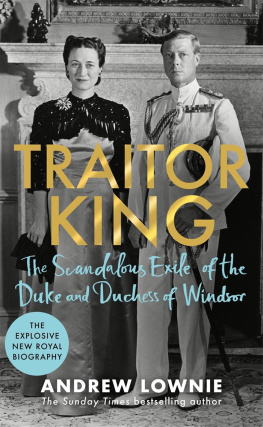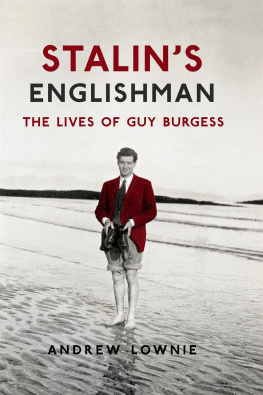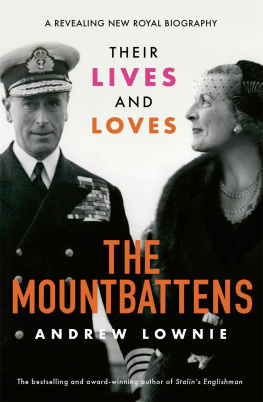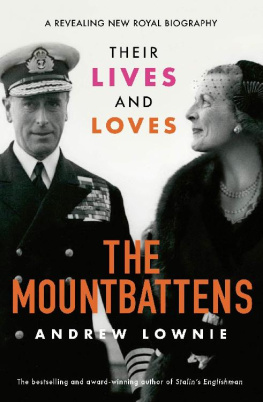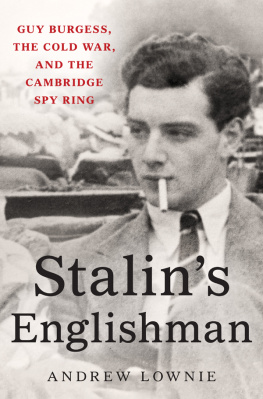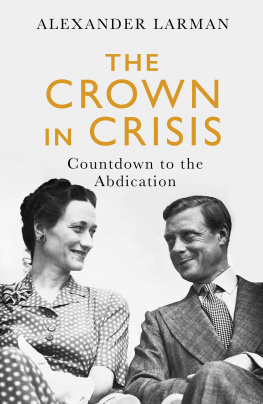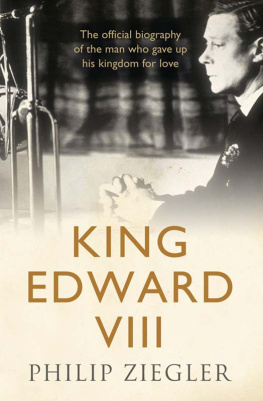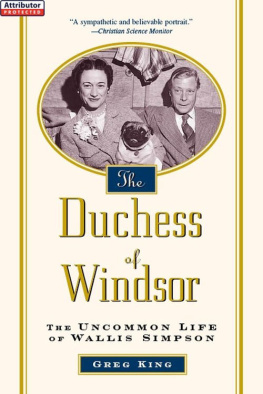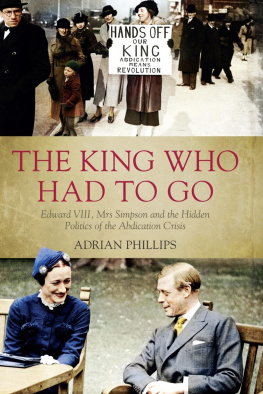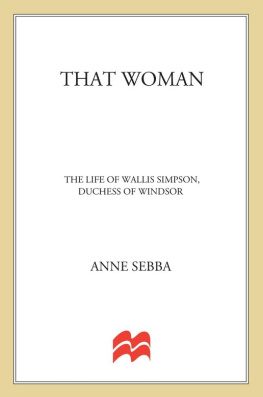
Praise for The Mountbattens
A compelling new biography ... superbly researched Daily Express
[A] well-researched, enjoyable book ... fair-minded and revealing Jane Ridley, The Oldie
This impeccably researched joint biography is an enthralling portrait of two complex individuals whose public and private lives were somewhat inextricably entwined Daily Mail
Everything a top-notch biography should be Budapest Times
A hugely entertaining and readable royal biography Yorkpress.co.uk
Well-written and reads very easily ... a valuable warts and all portrait of a couple who were centre stage in British public life for some sixty years. Recommended The Naval Review
Dares to go where no other Mountbatten biography has gone before The Lady
Praise for Stalins Englishman: The Lives of Guy Burgess
An abundance of vivid detail ... a matchless and splendidly exciting read The Times
An astonishing piece of research Sunday Times
A superb biography more riveting than a spy novel Sunday Telegraph
A remarkable and definitive portrait Frederick Forsyth
A superb biography ... Brilliantly told Evening Standard
Exhaustively researched and absorbing New Statesman
Shrewd, thorough, revelatory William Boyd
Praise for John Buchan: The Presbyterian Cavalier
An affectionate, admirably well-researched study from an intelligent biographer. Well worth reading Daily Mail
Andrew Lownie has brought this most extraordinary man to life in a way no previous writer has Independent
Fascinating reading The Scotsman
Thorough and lucid New York Times

First published in the UK by Blink Publishing
An imprint of Bonnier Books UK
4th Floor, Victoria House
Bloomsbury Square
London, WC1B 4DA
Owned by Bonnier Books
Sveavgen 56, Stockholm, Sweden
http://www.blinkpublishing.co.uk
facebook.com/blinkpublishing
twitter.com/blinkpublishing
Hardback: 9781788704816
Trade Paperback: 9781788704830
Paperback: 9781788704878
Ebook: 9781788704854
Audiobook: 9781788704861
All rights reserved. No part of this publication may be reproduced, stored in a retrieval system, or transmitted in any form or by any means, without the prior permission in writing of the publisher, nor be otherwise circulated in any form of binding or cover other than that in which it is published and without a similar condition including this condition being imposed on the subsequent purchaser.
British Library Cataloguing-in-Publication Data:
A catalogue record for this book is available from the British Library.
Design by www.envydesign.co.uk
1 3 5 7 9 10 8 6 4 2
Copyright Andrew Lownie, 2021
Andrew Lownie has asserted his moral right to be identified as the author of this Work in accordance with the Copyright, Designs and Patents Act 1988.
The publisher has made every effort to contact rights holders for permission to use their material, but in the event of any omission, will happily make amends and update the publication at the earliest opportunity.
Blink Publishing is an imprint of Bonnier Books UK
www.bonnierbooks.co.uk
Contents
The Year of Three Kings
On Friday 11 December 1936, the final vote on the Abdication Bill was passed in Parliament and Edward VIII ceased to be king. He had reigned for 326 days. His fathers premonition that within twelve months of his death his son would ruin himself had come true.
The newly created Duke of Windsor spent the afternoon packing and reading letters of support and sympathy at his country house, Fort Belvedere, in Windsor Great Park. A sham Gothic royal folly with battlements, rows of cannons, turrets and a tower, it had been built for William, Duke of Cumberland between 1746 and 1757, then embellished by the Regency architect Sir Jeffry Wyatville in the reign of George IV.
Prince Edward had taken over the grace and favour residence in 1929. He was later to write: The Fort had been more than a home; it had been a way of life for me. I had created the Fort just as my grandfather had created Sandringham; I loved it in the same way; it was there that I had passed the happiest days of my life.
Sir Giles Gilbert Scott had added a guest wing in 1936 and Edward had installed central heating, en-suite bathrooms, a tennis court, swimming pool, and in the basement, a Turkish bath. It was his private retreat where he had entertained most weekends and where his romance had played out with the woman for whom he had given up the throne. Now he was having to leave it and his staff to venture into an uncertain future.
At 4 p.m., Winston Churchill, who had joined him for lunch and to help polish his speech, left the Fort, his eyes filled with tears, muttering a couplet by Andrew Marvell about the beheading of Charles I:
He nothing common did or mean
Upon that memorable scene
Next there was a dinner to say goodbye to his family: his sister Mary and his mother, Queen Mary, widow of George V; his younger brothers, Henry, Duke of Gloucester; George, Duke of Kent; and Bertie, the new King George VI.
At 7 p.m., his faithful chauffeur, George Ladbroke, drove him the five miles to Royal Lodge, where the family had gathered. It was a strained atmosphere. Bertie was coming to terms with the responsibilities and challenges of his new role, whilst the rest of the Royal Family was still reeling from the events of the past few weeks, when David (as Edward was known in the family) had threatened to commit suicide if he could not marry the twice-divorced American, Wallis Simpson.
The new Duke of Windsor, on the other hand, felt liberated. His obsession with Wallis had given him an excuse to renounce the role of king, which he had increasingly not wanted. It had also allowed the government, concerned about his political views, especially towards Germany, and whether he had the qualities needed to be monarch, to force him to abdicate.
At 9.30 p.m., whilst the family was still at dinner, the lawyer Walter Monckton, Edwards trusted adviser and a friend since Oxford days, arrived to escort him to Windsor Castle, where the former king was due to broadcast to the nation. They drove in silence down the Long Walk Walliss cairn terrier, Slipper, on Windsors lap turned into the huge Quadrangle and stopped at the Sovereigns Entrance, where Sir John Reith, the Director-General of the BBC, was waiting. Windsor got out of the car holding a cigar in one hand and Slipper in the other and introduced Monckton to Reith.
The broadcast was to be in the kings former living quarters, a small suite in the Augusta Tower; given its size, most of the electrical equipment had to be set up in the corridor. Windsor greeted the technicians affably and went into the sitting room, where the microphones stood on a table with a chair facing them and an evening newspaper beside them. Reith handed him the paper and requested him to read a few lines aloud to test the voice levels he chose a passage on lawn tennis. He then popped into the loo, returning with words, I expect thats the last time Ill use that place.
Just before 10 p.m., Reith sat down at the microphone, waiting for the red light to flash. As it did so, he began, This is Windsor Castle. His Royal Highness the Prince Edward. As he slid out of the chair to the left, the former king slid in from the right.
Next page
